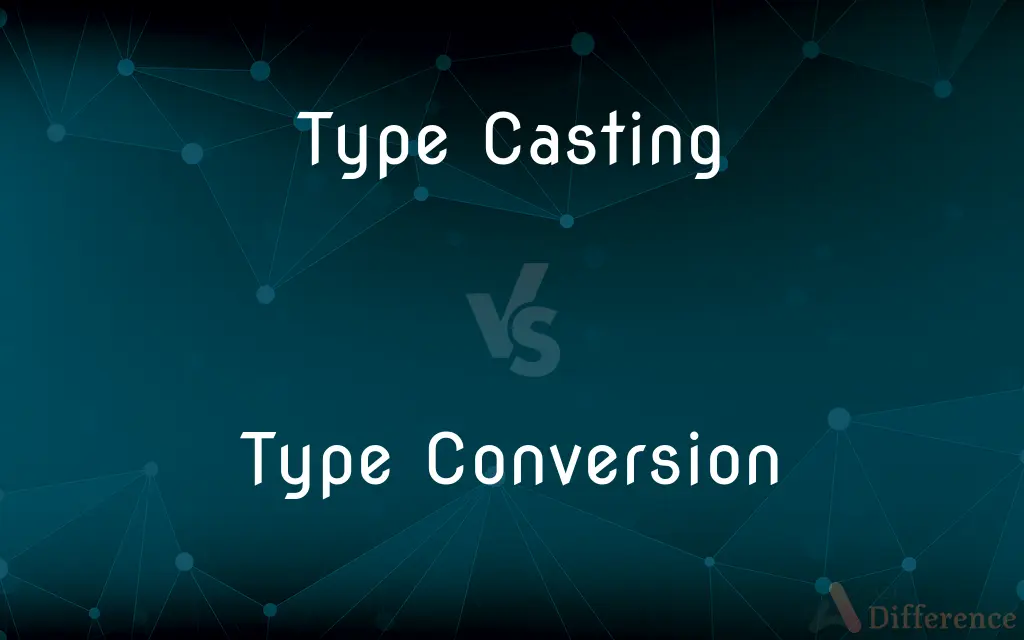Type Casting vs. Type Conversion — What's the Difference?
By Tayyaba Rehman — Published on January 16, 2024
Type casting is the explicit conversion of a data type by a programmer; type conversion is the automatic conversion of one data type to another by the compiler.

Difference Between Type Casting and Type Conversion
Table of Contents
ADVERTISEMENT
Key Differences
Type casting is a method where a programmer explicitly converts a variable from one type to another. It's used when the programmer wants to change the data type intentionally, often to utilize specific features of that data type. Type conversion, also known as type coercion, is automatically performed by the compiler or interpreter when it deems necessary, usually during operations involving mixed data types.
In type casting, the programmer has control over the conversion process and must ensure the cast is appropriate to avoid data loss or errors. It is a conscious decision made in the code. In contrast, type conversion happens implicitly, without the programmer's explicit intervention, and is managed by the language's rules.
Type casting is often used when precision is needed in calculations or when interfacing with functions that require specific data types. It's a common practice in statically typed languages where the data type of a variable is known at compile time. Type conversion is more common in dynamically typed languages, where the data type of a variable can change at runtime.
An example of type casting is converting an integer to a float to perform floating-point arithmetic. This action is done manually by the programmer. An example of type conversion is adding an integer to a floating-point number, where the compiler automatically converts the integer to a float to perform the operation.
Understanding the difference between type casting and type conversion is crucial for debugging and writing efficient, error-free code. Incorrect type casting can lead to data loss or runtime errors, while reliance on automatic type conversion can lead to unexpected results, especially in complex expressions or operations.
ADVERTISEMENT
Comparison Chart
Initiation
Explicitly by the programmer
Automatically by the compiler/interpreter
Control
Programmer has full control
Handled by language rules
Purpose
To use specific features of a data type
To facilitate operations on mixed types
Common in
Statically typed languages
Dynamically typed languages
Risk
Possibility of data loss or errors
Might lead to unexpected results
Compare with Definitions
Type Casting
Changing data types for specific functionality.
Type casting from a base class to a derived class accessed specialized methods.
Type Conversion
Compiler's adaptation of data types in operations.
Type conversion occurred when adding an integer to a float.
Type Casting
Manually modifying data types in code.
Type casting a double to an integer truncated the decimal part.
Type Conversion
Automatic data type change by the compiler.
The compiler performed type conversion from int to double during the calculation.
Type Casting
Explicitly changing a variable's data type.
Type casting an integer to a float allowed for precise decimal calculations.
Type Conversion
Implicitly handled data type adjustments.
In Python, type conversion automatically handled the integer to string conversion during concatenation.
Type Casting
Converting data types with explicit syntax.
In C++, static_cast was used for safe type casting between types.
Type Conversion
Implicit change of data types.
Type conversion seamlessly handled the string to integer conversion during parsing.
Type Casting
Programmer-controlled data type conversion.
The programmer used type casting to convert the char to an int for arithmetic operations.
Type Conversion
Changing data types without explicit command.
The script's dynamic type conversion adjusted types during runtime.
Common Curiosities
Is type conversion safe in Python?
Generally yes, but it depends on the context and the types involved.
Can type conversion lead to errors?
It can, especially if the automatic conversion is not as expected by the programmer.
How does type casting affect performance?
It can impact performance if not used carefully, especially in conversions involving large data structures.
What are the risks of type casting?
It can lead to data loss or runtime errors if not done correctly.
Can type casting change the structure of data?
Yes, especially in object-oriented languages where it can change the perceived class of an object.
What is type conversion?
It's the automatic conversion of a data type by the compiler or interpreter.
When does type conversion occur?
During operations involving mixed data types, handled automatically by the language.
What is type casting?
It's the explicit conversion of a data type by the programmer.
Why use type casting?
To intentionally change data types for specific functionalities or compatibility.
Is type casting common in C++?
Yes, it's frequently used in C++ for precise control over data types.
Can type casting be used in JavaScript?
Yes, JavaScript allows explicit type casting, though it's a dynamically typed language.
Does Java support type conversion?
Yes, Java performs automatic type conversion in certain scenarios.
What is an example of type conversion in C#?
Implicit conversion from int to long during an assignment operation.
Is type conversion reversible?
Not always, especially if the original data type has a larger range or different structure.
How is type casting done in Python?
Using functions like int(), float(), and str() to convert between types.
Share Your Discovery

Previous Comparison
VFX vs. CGI
Next Comparison
Christian Bible vs. Jewish BibleAuthor Spotlight
Written by
Tayyaba RehmanTayyaba Rehman is a distinguished writer, currently serving as a primary contributor to askdifference.com. As a researcher in semantics and etymology, Tayyaba's passion for the complexity of languages and their distinctions has found a perfect home on the platform. Tayyaba delves into the intricacies of language, distinguishing between commonly confused words and phrases, thereby providing clarity for readers worldwide.
















































